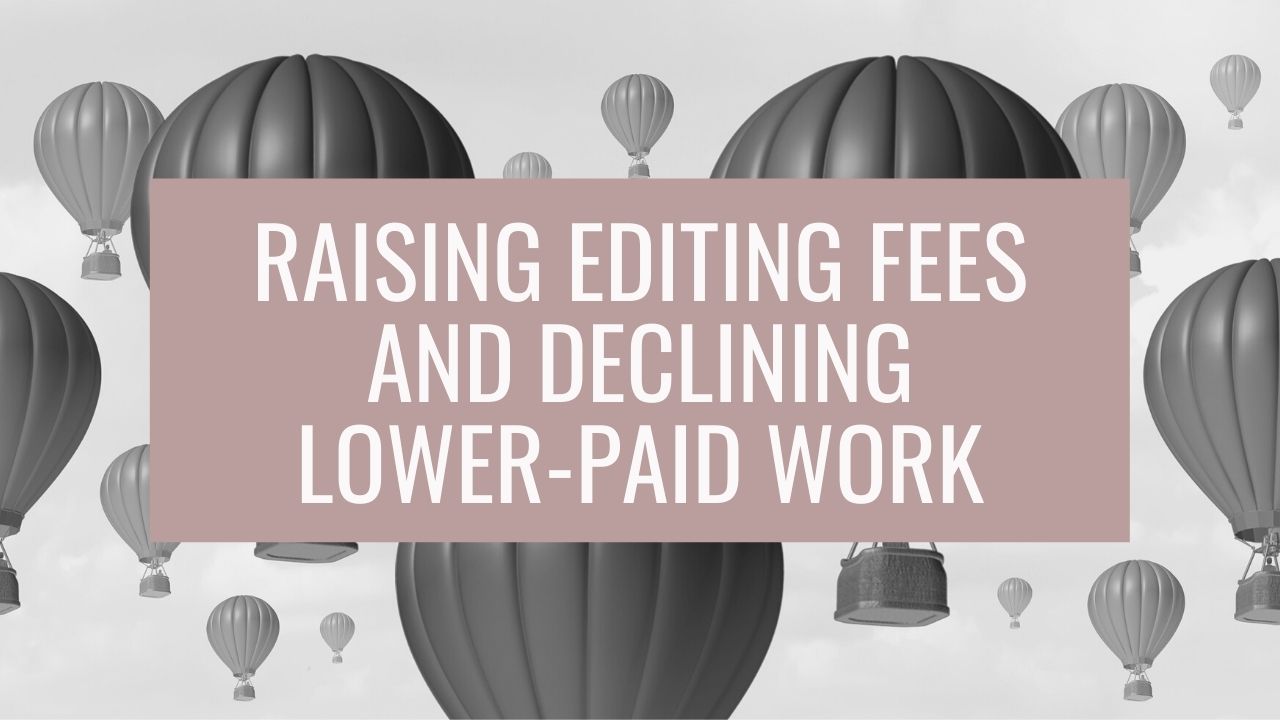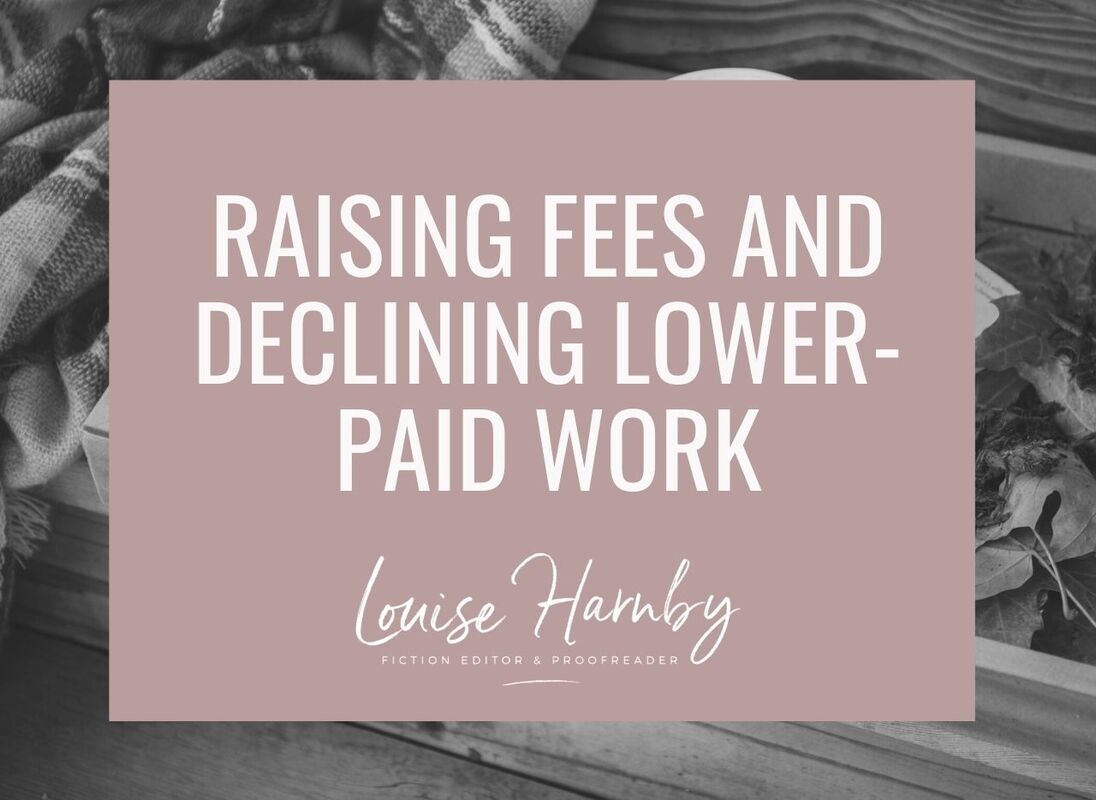|
In this article, I consider several approaches to increasing editing income and declining lower-paid work. These respect editors' differing circumstances, client bases and business goals.
How to increase editing and proofreading income
Taking annual action to increase income from freelance editorial work is simply good business practice. Earnings need to keep up with cost-of-living increases else our editorial businesses could fail. Even if they don't fail, the decline in profitability could have a significant impact on our lifestyle and well-being. What we earn is determined by the following:
Increasing our earnings is not always straightforward, though. You or I might think our desired rate increase is entirely justified (for example, because of inflation). However, what you or I think is not the issue. Any change to a pricing model must consider the client’s response for the simple reason that the client might not be prepared to pay. Remember:
Decisions about what to set or accept therefore need to be carefully planned. Avoiding knee-jerk thinking If a colleague states that they’ve decided to no longer edit for ‘low’ rates, by all means congratulate them on their business decision. Don’t assume, though, that their decision is the same one you should be making. Before you impulsively follow their lead, ask yourself the following questions:
In other words, don’t feel compelled to decline work just because your colleagues deem what’s on offer as a bum deal. Their current circumstances might be very different from yours. Not everyone can afford to be unemployed, and the choices available to a mature freelance-business owner may be very different from those on offer to the beginner. Case study – the price-accepter When you’re a price-accepter, the process for managing rates is usually one of the following:
In the first five years of owning my editorial business, I was almost exclusively a price-accepter. My main clients were publishers and packagers. Returning to the knee-jerk-avoidance issues:
During that phase, I was a negotiator and a phase-outer. I’d take the work to ensure a full schedule. I gained experience and testimonials, and I expanded my portfolio – all great marketing tools. As I acquired better-paying clients, I phased out the 15-pounder, then the 18-pounder, then the 20-pounder, and so on. It was a gradual process. In 2017, my marketing strategy has paid off. I’m highly visible. I’ve got the experience, the testimonials and the portfolio to make me interesting to enough non-publisher clients that I can decline a price and walk away. I’ve moved from negotiation and phasing-out to responding with a flat refusal. Case study – the price-setter When you’re a price-setter, the process for managing rates is usually one of the following:
In the first five years of owning my editorial business, I had few clients for whom I set the price, and I was still developing my visibility. If there was space in my schedule, I’d try to fill it by negotiating and offering phased-in fee increases for regular clients. In 2017, things have changed. I’m a flat-increaser. If the client doesn’t like the fee on offer, no problem. I thank them for their interest and wish them luck. Returning to the knee-jerk-avoidance issues:
As I hope the two examples above show, the approaches we take can vary over time and depend on individual circumstances. There’s no one-size-fits-all response. Some additional thoughts
Managing rates is a journey Increasing earnings isn’t about knee-jerk reactions. Rather, it’s a journey. Depending on your circumstances, you might handle things one way now, and another way further down the road. Whether you buckle, negotiate, phase in/out, or make flat-out decisions will be based on your circumstances. There’s no one, true way to do it and there’s no shame in any of those choices as long as they’re done in relation to an analysis of your business needs and goals. More information
Louise Harnby is a line editor, copyeditor and proofreader who specializes in working with crime, mystery, suspense and thriller writers.
She is an Advanced Professional Member of the Chartered Institute of Editing and Proofreading (CIEP), a member of ACES, a Partner Member of The Alliance of Independent Authors (ALLi), and co-hosts The Editing Podcast. Visit her business website at Louise Harnby | Fiction Editor & Proofreader, say hello on Twitter at @LouiseHarnby, connect via Facebook and LinkedIn, and check out her books and courses.
11 Comments
1/2/2017 04:25:08 pm
Excellent article, Louise. Everyone deserves to make a living for services of value.
Reply
1/2/2017 11:12:16 pm
Great article, Louise. I'm lucky to be in a similar situation to you, I'm mostly in the flat increase phase and I have a partner who makes the lion's share of the household income. But one important point for me still is, DON'T BE A SHEEP. After ten years in this business, I'm still sheepish about raising my rates and the fear of rejection remains. So my resolution for 2017 is to 'toughen up'!
Reply
Louise Harnby
1/2/2017 11:50:10 pm
You're only human, Sally! I find it much easier to have straightforward conversations about money with new clients than with existing ones. I think some of that comes from having worked for so many years with clients for whom I was in a price-accepting position. It's great that you're in a position to get tougher, though, and know you can afford to take the rejection on the chin if it should come to that.
Reply
2/2/2017 01:32:10 am
Great article Louise. I tend to agree with Sally. 2017 is a year to toughen up and not be afraid of rejection. Though, in all honesty, I can't help myself and continue to offer 'a little' flexibility with my fees. It seems that proofreading/editing has gained popularity of late. There is a fair amount of competition out there in the marketplace. On the other hand, repeat business is still good and feedback from clients is what keeps me keeping on ...
Reply
Louise Harnby
2/2/2017 01:57:32 pm
I agree - repeat business is something never to be sniffed at. It provides us with stability so that we can make changes at a later stage if we want to. Flexibility is good too. It's all about working within your own parameters, not your colleagues', so that you make the right decisions for your business. Sometimes we have to find the right time to be tough, rather than doing it in a knee-jerk fashion. Keep up the great work!
Reply
2/2/2017 11:23:38 am
Another very clear and thoughtful article, Louise. The point about managing your rates being a journey is spot-on. When I first started out, I wasn't sure what I should be charging. As I got into the swing of things, I learned what worked for MY business and stopped comparing my rates to other editors' so much. And I know that as circumstances change, I must continue to adjust.
Reply
Louise Harnby
2/2/2017 02:01:33 pm
Exactly, Sophie! Comparisons can cause us to trip up and make decisions based on the wrong factors. I think our industry is particularly prone to trying to find universal pricing solutions to what is a diverse market served by a ton of equally diverse suppliers with very different needs. I, like you, am always thinking about whether I need/want to adjust based on the what's happening now and where I want to be further down the road!
Reply
2/2/2017 01:26:23 pm
Thank you for this really useful article, Louise. As ever, completely on the button! I empathise with your case studies. I'm still quite a newbie, I feel, and still exploring how best to market my business. However, I'm the sole breadwinner in my household and that can lead to scary times. At the moment I'm in the never-experienced-before position of being booked up for the next four months, but based on past experience, fully anticipate a famine period at some point, for which I have to be ready. I am both a price setter and a price accepter, but I haven't yet tried negotiating with a publisher! You inspire me so much, Louise. Thank you again.
Reply
2/2/2017 01:53:22 pm
Thank you, Lesley. I'm really pleased you found it useful. Congratulations on your feast period and good on you for doing the necessaries to try to avoid famine! I have some more posts coming up about rates in relation to business ownership. I hope you'll find them just as useful. You sound like you've got your head in exactly the right place. Keep it up!
Reply
22/3/2017 06:19:57 pm
Great article, thank you - this is the challenge I'm tackling this year!
Reply
Louise Harnby
22/3/2017 06:32:36 pm
Good luck with it, Sara!
Reply
Leave a Reply. |
BLOG ALERTSIf you'd like me to email you when a new blog post is available, sign up for blog alerts!
TESTIMONIALSDare Rogers'Louise uses her expertise to hone a story until it's razor sharp, while still allowing the author’s voice to remain dominant.'Jeff Carson'I wholeheartedly recommend her services ... Just don’t hire her when I need her.'J B Turner'Sincere thanks for a beautiful and elegant piece of work. First class.'Ayshe Gemedzhy'What makes her stand out and shine is her ability to immerse herself in your story.'Salt Publishing'A million thanks – your mark-up is perfect, as always.'CATEGORIES
All
ARCHIVES
July 2024
|
|
|
|

















 RSS Feed
RSS Feed





